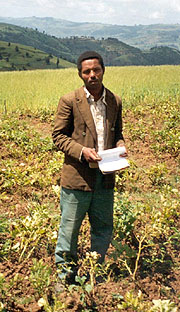 |








 |
 |

Overview
 |
|
 |
FARMER FIELD SCHOOL
Ginchi, Ethiopia

A farmer in Ginchi tells researchers his experiences in managing potato blight through integrated pest management. Seed potato has become very popular among farmers in Ginchi due to the value added over the traditional ware potato, filling an important gap in the capacity of national seed systems to meet the growing demand for seed.
 |
|
The African Highlands Initiative (AHI) is an ecoregional program of the Consultative Group for International Agricultural Research (CGIAR) and a network of the Association for Strengthening Agricultural Research in Eastern and Central Africa (ASARECA) hosted by the World Agroforestry Centre (ICRAF). Its aim is to improve livelihoods and reverse natural resource degradation in the densely settled highlands of eastern and central Africa. AHI is a consortium of eastern African and international research organizations that work with local communities, local governments and development partners in Ethiopia, Kenya, Tanzania, Uganda and Rwanda.
AHI works where the people and landscapes in the densely populated highlands of Eastern Africa are under pressure. Population growth, fragile landscapes, limited economic opportunities and the rapid pace of climatic, political-economic and cultural change have outpaced people's coping strategies, causing water shortages, deforestation, soil erosion, unreliable rainfall, increased incidence of pests and diseases and increased poverty. The target ecoregion faces the following major challenges at local and institutional levels:
- Under-utilized potential of local people to manage their resources sustainably and to articulate their demands
- A breakdown in natural resource governance
- Conventional research approaches that are not addressing the complexity of modernization processes, livelihood-NRM links and farmer demand
- Limited capacity of researchers and their organizations and policy makers to respond to challenges of working in an integrated, participatory manner
AHI's core role as an innovator is to develop innovative methods and approaches for participatory "integrated natural resource management" (INRM) through their development and testing in pilot sites, cross-site synthesis and regional dissemination and institutionalization. AHI's targeted beneficiaries and partners in this work include national and international research organizations and networks, development organizations, local government, civil society organizations, service providers, policy makers, community-based organizations, and male and female farmers.
 |
 |
|

